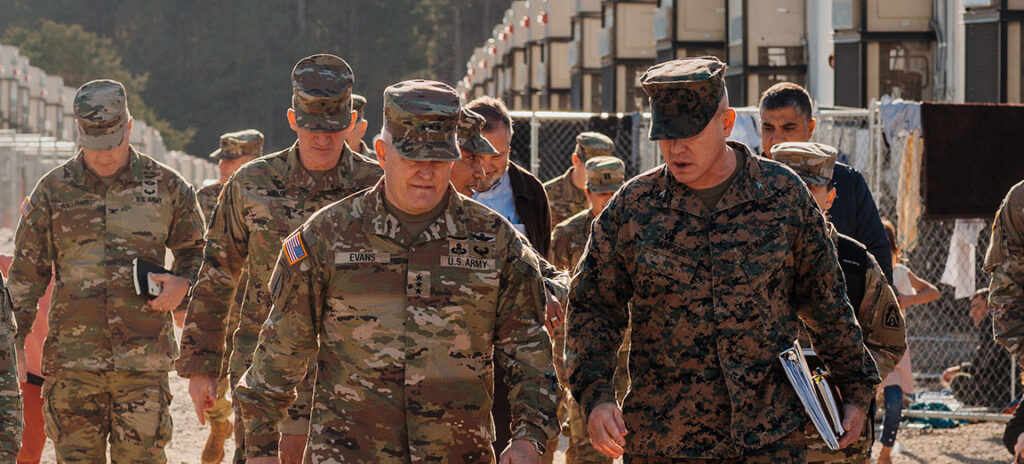U.S. Army North (ARNORTH) Commander Lt. Gen. John Evans visits Fort Pickett in Virginia shortly after taking command in December 2021. Evans retired as commander in August 2024. U.S. ARMY
THE WATCH STAFF
U.S. Army North’s (ARNORTH) commander, Lt. Gen. John Evans, retired in August 2024 after nearly three years of leadership at the command, which oversees all Army activity in the U.S. and supports civil authorities in responding to natural disasters. U.S. Army North also works closely with Canada and Mexico in collaborative efforts to strengthen defense relationships to address shared security concerns in the cooperative defense of North America.
Evans assumed command of ARNORTH in September 2021, serving nearly three years before retiring in August 2024 after 36 years of service. During his tenure, ARNORTH faced a near-constant barrage of challenges, including the COVID-19 pandemic and the care and resettlement of 76,000 Afghan evacuees who fled their country after the 2021 U.S. withdrawal. Evans simultaneously oversaw a shift in training, equipment and formations to face an increasing strategic threat from the People’s Republic of China (PRC) and Russia and away from its previous posture of counterinsurgency and counterterrorism. Before ARNORTH, Evans led U.S. Army Cadet Command from 2018 to 2021, according to the Army Times.
After spending most of his Army career in special operations, Evans said he knew little about homeland defense and defense support of civil authorities before taking command of ARNORTH. He learned quickly. “Coming into command in 2021 we were right at the back end of COVID, kind of going into Phase 2 of COVID response. Our team was weary when I got here. There had been incredible work to support all our civil authorities. And right then we started seeing the withdrawal from Afghanistan and knowing we were going to have people we needed to get out of Afghanistan. That was one of the largest single-event immigration events in the history of the United States,” Evans told the Army Times.
Effectively leading homeland defense and response operations required a change of mindset, Evans said. “For so many Soldiers who are used to being in a forward deployed theater, particularly considering the wars in Afghanistan and Iraq, the military is always the lead organization, so they’re used to having a certain autonomy in decision-making. But the military is never the lead organization in the homeland for response. It’s a complete reversal when you’re in the homeland. So that takes some depth management. It takes some understanding of how you’re building that organizational dynamic,” Evans told the military newspaper.
Evans said the threat to the homeland isn’t likely to mimic movies like “Red Dawn.” Instead, he said, cyberattacks, space-based attacks and other strategies would aim to slow the U.S.’s ability to deploy its unrivaled power around the world. “We count on our ability to deploy rapidly, and it’s unique to the United States; nobody else has it. So, we must look at where are our vulnerabilities and what can we do to better prepare ourselves now so that if we face conflict, we can assure our projection for the forward commanders.”
One remaining challenge for the U.S. military is a more global approach as it relates to military commands, Evans said. “The bottom line is we are globally interconnected. What happens in one command affects what happens in the homeland. What happens in the Indo-Pacific Command can affect what happens in Central Command. I think as we move forward, we’ve got to be careful because law and policy are set up to support the regional construct. But I think we have to broaden that aperture a little bit and look at things much more globally and holistically.”
Earlier in his career, Evans was a deputy commanding general (support), 2nd Infantry Division (Combined), 8th Army, Republic of Korea, and a commanding general of the Special Operations Aviation Command in Fort Bragg (now Fort Liberty) in North Carolina.
Maj. Gen. Scott M. Sherman replaced Evans as commander of ARNORTH. Sherman is also assigned as the deputy commanding general-support and deputy commanding general-National Guard for United States Army North (5th Army). Additionally, he serves as the commander of Task Force 51, U.S. Army North’s Contingency Command Post, which specializes in command and control of federal military support during operations of homeland defense and defense support of civil authorities, according to his official Army biography.

